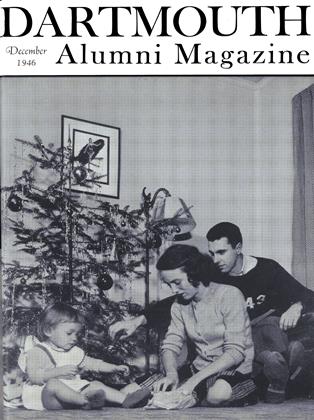PRESIDENT DICKEY WILL serve as Acting Director of the "Great Issues" course to be required of all Dartmouth seniors beginning with the Class of 1948, it was announced last month. Prof. Arthur M. Wilson, of the Biography and Government departments, has been named Associate Director.
The "Great Issues" course was approved by the Dartmouth faculty last February as part of the College's revised curriculum. To direct planning and organization of the course, the Committee on Educational Policy has appointed a steering committee which will have a rotating membership. Student opinion will be consulted as to content of the course each year. In addition to the Acting and Associate Directors, the steering committee consists of Prof. William W. Ballard 'sB of the Zoology department, Prof. Arthur E. Jensen of the English department, Prof. Alexander Laing '25, assistant librarian and Prof. Earl R. Sikes of the Economics department. John M. Clark '32 will serve as executive secretary.
Designed for seniors who are shortly to assume responsibilities as citizens, the full-year program will be compulsory for the entire graduating class, including those enrolled in the business, medical and engineering schools. During the first year, however, exemptions may be arranged in cases of irreconcilable schedule conflicts or special hardship.
The course will deal with issues of basic import in the fields of the sciences, social sciences and humanities. Authorities on current questions will be invited to Hanover for weekly lectures, and will remain for forum discussions. One session each week will be devoted to preliminary briefing as well as analysis of the discussions by specially qualified faculty members.
A public affairs laboratory is planned for Baker Library in conjunction with the new course. To be developed by Professor Laing, the laboratory will provide background material for the weekly studies. Plans call for displays of newspapers, periodicals, publications of special interests, and Government literature which will habituate seniors to the information sources commonly available after graduation and also alert them to differences in editorial approach and treatment. In addition, books will be assembled to give historical focus to the course.
 View Full Issue
View Full Issue
More From This Issue
-
 Article
ArticleHOPKINS CENTER
December 1946 By SIDNEY C. HAYWARD '26 -
 Article
ArticleON THE HILL
December 1946 -
 Class Notes
Class Notes1918
December 1946 By ERNEST H. EARLEY, DONALD L. BARR -
 Class Notes
Class Notes1928
December 1946 By OSMUN SKINNER, RUPERT C. THOMPSON JR. -
 Class Notes
Class Notes1919
December 1946 By J. KENNETH HUNTINGTON, MAX A. NORTON -
 Class Notes
Class Notes1917
December 1946 By MOTT D. BROWN, DONALD BROOKS







